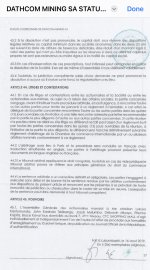cruiser51
Top 20
Did you notice Cominiere (a Government agency), MoP and MoM (this is the DRC government btw) don't give a flying fuk about any law and make things up on the go, as they please?The law fucking cares what on earth are you on about
I thought it is pretty clear by now that the only rule which has applied is :'the one who pays the biggest brown paper bags into specific private accounts, gets the deal'.
It has absofukkindiddlysquat to do with any law.
If the fukkin law would matter, there would be no need to go to the ICC.
So much for your caring law.



